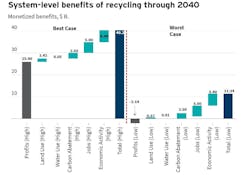Study Quantifies Economic, Environmental Benefits of EV Battery Recycling
What you’ll learn:
- A circular battery economy—one in which end-of-life batteries are repurposed, reused, or recycled—can help strengthen the electric-vehicle supply chain.
- Recycling batteries is expected to add $11B to $40B to the global economy.
- As the battery reuse/recycling industry matures, it will reduce emissions related to EV production.
As commercial-scale recycling lithium-of based batteries begins to ramp up, a recent study by the Rocky Mountain Institute shows that the emerging industry is already beginning to help shrink the cost of EVs and energy storage systems. It’s also reducing manufacturers’ dependence on fluctuations in the availability of raw materials.
The study, titled “Battery Recycling: How Accounting for Social and Environmental Benefits Boosts Returns,” studies three specific metrics of the benefits generated by battery recycling:
- Financial metrics: Includes profit pools from a typical recycling facility that uses hydrometallurgical processing and performs both shredding and refining.
- Environmental metrics: Measured through reductions in emissions, land use, and water use.
- Social metrics: Measured using the income from the average number of jobs created per ton of recycling capacity and the resulting economic growth.
The study doesn’t fully explore the economic uncertainties created by recent tariff disputes and the threat of export embargoes imposed by hostile nations that control large fractions of the world’s supply of essential battery materials. Still, it’s becoming increasingly apparent that investing in the “circularization” of the battery supply chain will yield multiple benefits, according to the report.
>>Check out this TechXchange for similar articles and videos
Next in This Edition of PowerBites
More PowerBites
About the Author
Lee Goldberg
Contributing Editor
Lee Goldberg is a self-identified “Recovering Engineer,” Maker/Hacker, Green-Tech Maven, Aviator, Gadfly, and Geek Dad. He spent the first 18 years of his career helping design microprocessors, embedded systems, renewable energy applications, and the occasional interplanetary spacecraft. After trading his ‘scope and soldering iron for a keyboard and a second career as a tech journalist, he’s spent the next two decades at several print and online engineering publications.
Lee’s current focus is power electronics, especially the technologies involved with energy efficiency, energy management, and renewable energy. This dovetails with his coverage of sustainable technologies and various environmental and social issues within the engineering community that he began in 1996. Lee also covers 3D printers, open-source hardware, and other Maker/Hacker technologies.
Lee holds a BSEE in Electrical Engineering from Thomas Edison College, and participated in a colloquium on technology, society, and the environment at Goddard College’s Institute for Social Ecology. His book, “Green Electronics/Green Bottom Line - A Commonsense Guide To Environmentally Responsible Engineering and Management,” was published by Newnes Press.
Lee, his wife Catherine, and his daughter Anwyn currently reside in the outskirts of Princeton N.J., where they masquerade as a typical suburban family.
Lee also writes the regular PowerBites series.







